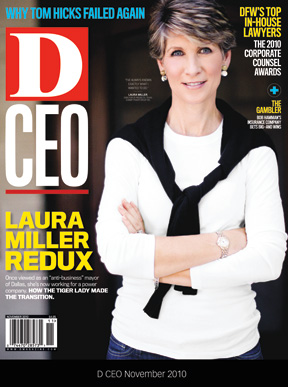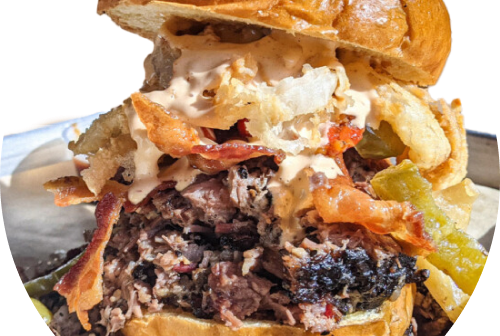The next time you dig into your favorite dish at a local Mexican restaurant, be careful—you may be biting into a trade secret. At least that’s the contention at the hot pink center of Dallas’ latest restaurant war, a battle between the proprietors of the popular Gloria’s chain of Mexican/Salvadoran eateries and a former manager it accused of stealing recipes and employees for his own start-up venture.
The case raises questions about how businesses go about protecting themselves and their intellectual property through the use of “non-compete” agreements for executives and key senior management. And just as companies have become accustomed to navigating the ins and outs of non-compete law, the Texas Supreme Court stands poised to consider what some observers feel will be a sea change in how non-compete agreements are used by businesses and interpreted by the courts.
But first, the ingredients for this food fight. It all began last September, when Mario Alfaro and business partner Sabino Valle opened their restaurant Mario Sabino’s on Lemmon Avenue, approximately a mile from one of the 11 Gloria’s restaurants that dot north Texas (a 12th location recently opened in Austin). Alfaro had been a true Gloria’s insider; besides serving as the general manager for one of the restaurants since 1989, he and Jose Fuentes (owner Gloria Rubio’s ex-husband and one of the chain’s current owners) are second cousins.
According to documents filed in Dallas County’s 162nd District Court, Gloria Rubio and Jose Fuentes insist that although Alfaro wasn’t taught the recipes per se, he knew “the process, the ingredients, the preparation, and execution of Gloria’s dishes.” Rubio claimed in an affidavit that the recipes for Gloria’s distinctive blend of Mexican and Salvadoran cuisines came “from El Salvador, from my mother and grandmother, and from extensive travel and research.” She also testified that the restaurant chain takes pains to maintain the secrecy of these recipes, keeping them stored in an undisclosed location and not giving the chefs access to them in written form (Rubio says she trains the cooks herself from memory).
Rubio and Fuentes allege that Alfaro and his partner have engaged in a kind of culinary espionage, serving dishes identical to what they consider to be Gloria’s signature concoctions—everything from the double-refried black bean dip to margaritas. They provided menus from both restaurants to demonstrate the similarities. But Alfaro, his attorney Robert Buchholz, and former Gloria’s cooks now working at Mario Sabino’s counter that the supposed trade secrets were never secret at all. Alfaro testified in an affidavit that a number of dishes will necessarily feature the same ingredients; as he puts it, “All chicken dishes contain chicken, for example.” He insists that such culinary nuances as seasonings and proportions used are completely different between the two kitchens, maintaining that his variations on common Mexican and Salvadoran dishes are “vastly superior to those served at Gloria’s.” (Ouch!) Attorney Buchholz points out that “not only did the plaintiffs have no written agreements with Alfaro that would limit him from using any recipes, but they also never produced any evidence of the supposedly secret recipes themselves.”
Although Associate Judge Sheryl McFarlin temporarily barred Alfaro and Valle from offering some of the disputed dishes, the upstart restaurateurs would have the last laugh. Their attorney filed a motion for summary judgment, arguing that the case should be dismissed since there was no evidence that the Gloria’s recipes were trade secrets at all, or that they had been stolen. Judge Lorraine Raggio agreed, and indicated that she would soon be signing an order granting the defendants’ motion. Buchholz, who has also filed a counterclaim for malicious prosecution and civil conspiracy against the plaintiffs, says the ruling “represents a vindication of our position that there were no trade secrets.” These remaining claims were set for trial on Sept. 27, and plaintiffs’ attorney Tailim Song indicated that Gloria’s plans to appeal the judge’s decision.
They may be fighting an uphill battle. Although recipes can be copyrighted, that in and of itself won’t keep someone else from using the same formula or recreating the same food. Texas law provides protections for trade secrets that could include formulas, processes, or even recipes, but it also imposes strict requirements about the lengths to which a company must go to guard the secrecy of its information. Other restaurants have learned this lesson the hard way. In 2007, the Corpus Christi Court of Appeals rejected arguments by the Los Cucos Mexican Cafe chain that former employees had misappropriated its trade secret recipes and used them in opening up their own restaurants. Just as in the Gloria’s case, a summary judgment was granted for the former employees since there was no evidence that the Mexican food recipes in question qualified as trade secrets.
MAINTAINING SECRECY
The issue of former employees walking off with sensitive information is a genuine concern for any industry. A couple of 2009 studies by the Ponemon Institute reveal that more than half of all employees compromise their employers’ confidential information when leaving. More than two-thirds of survey respondents admitted to transferring confidential information to a flash drive. Traditionally, however, companies have to demonstrate not only that such proprietary information is truly a secret, but also that they’ve taken steps to maintain its secrecy. This could include such measures as restricted access or password protection, as well as written agreements with confidentiality/nondisclosure and non-compete provisions. As veteran employment attorney Michael P. Maslanka of Dallas’ Ford & Harrison points out, “You could conceivably take the same steps for maintaining the secrecy of an empañada recipe as you could for the source code for software.”
However, the legal landscape may be about to undergo a tectonic shift for companies wishing to protect both confidential information and key employees through the use of non-compete agreements. Historically, Texas law has tied the need for such a restrictive agreement with the need for an employee to have access to proprietary information.Courts have reasoned that a company’s goodwill depends, at least in part, on keeping trade secrets confidential. Such goodwill is an interest that merits the protection of a restraint on competition, so giving an employee confidential information—coupled with the worker’s promise to maintain this secrecy—has routinely been viewed by the courts as sufficient consideration for a non-compete agreement. Businesses haven’t been allowed to simply “buy” a non-compete by giving the employee cash or stock options instead of confidential information. But that may be about to change.
In September, the Texas Supreme Court was scheduled to hear oral argument in the case of Marsh USA Inc. v. Cook. Marsh had granted its employee Cook stock options, with the requirement that he sign a non-compete/non-solicitation agreement in order to exercise them. Cook signed the agreement, exercised the stock options, and then left in 2007 to begin working for a competitor contrary to the agreement. While Marsh argued that simply offering stock options to a key employee like Cook gives rise to an interest in protecting the company’s goodwill, the Dallas Court of Appeals rejected that argument. The appellate court distinguished between an incentive that benefits a business’ goodwill and one that actually gives rise to the interest in prohibiting an employee from competing. In short, the Dallas Court of Appeals said cash or stock alone won’t get you a valid non-compete.
However, the very fact that the Texas Supreme Court agreed to hear the case has legal observers convinced that change is in the air. Accordingly to attorney Maslanka, who frequently litigates non-compete agreements on behalf of employers, a Supreme Court reversal of the Dallas Court of Appeals’ holding would represent “a radical, radical change in Texas law.” For Maslanka, the idea of companies being able to essentially buy a non-compete is a troubling one. “The movement of talent is vital to a vibrant economy, and this will stifle that movement,” he says. Marsh and its supporters, on the other hand, claim that the Dallas appeals court decision “creates an environment hostile to economic development” and warn that “employers like Marsh, whose goodwill exists in the form of customer relationships, may have to consider relocating to states that clearly and consistently protect goodwill.”
A decision likely won’t be issued by the Supreme Court until early 2011. In the meantime, employers can only speculate on whether the Court’s advice to employees will be, “Take the money, and don’t run.”
John. G. Browning is a partner at the law firm of Thompson Coe Cousins & Irons in Dallas, and an award-winning journalist. His book The Lawyer’s Guide to Social Networking will be published this year.







